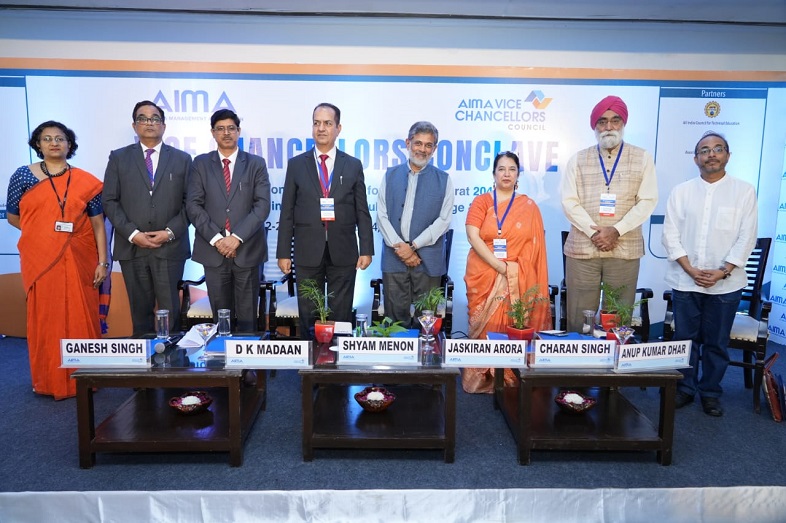
Gurugram, 4 December 2024: BML Munjal University, a Hero Group initiative, participated as an Associate Partner at the prestigious Vice Chancellors Conclave organized by the All India Management Association (AIMA) on 22nd and 23rd November in New Delhi. Themed “Transformational Leadership for a Viksit Bharat 2047: Transforming India into the Global Hub of Knowledge & Education,” the conclave aligned with India’s ambitious Viksit Bharat Vision 2047. It brought together eminent leaders in academia, industry, and policy to discuss pathways for establishing India as a global knowledge hub.
BMU’s Vice Chancellor, Dr. Shyam Menon, Dean of Education Quality, Dr. Jaskiran Arora, and Distinguished Visiting Professor, Prof. Anup Dhar contributed valuable insights during the panel discussions. BMU’s association with AIMA reflects its unwavering commitment to advancing the goals of the National Education Policy (NEP) 2020, particularly in promoting experiential learning as a cornerstone of modern education.
Addressing the conclave, Dr. Menon delivered a powerful critique of current educational paradigms, emphasizing the transformative potential of experiential learning: “We don’t realize that the greatest pedagogue of the 20th century – Gandhi – experimented with experiential learning. In any educational enterprise, the core process is learning, and the core protagonist is the learner. Teaching is a second-order activity; it is the facilitation of learning. Different kinds of learning require different enabling conditions. The two critical forms of learning are exploratory learning and problem-solving. These cannot emerge through didactic processes. You can’t simply passively receive information from a third person and expect learning to occur. Learning is fundamentally about the ability to ask the right questions. We must move beyond rote learning – the practice of memorizing and forgetting as soon as exams are over. Our current education system remains heavily dependent on rote learning, particularly for exams like JEE. We need to transcend this approach and focus on experiential learning that truly engages and transforms students.”
Building on this and differentiating between experiential learning and learning by experience, Prof. Anup Dhar added an evocative analogy, “Every day, we see the sunrise in the east and set in the west – this is the experience. But in 1612, one man reflected on this and asked: is it the sun that is moving from east to west, or are we the ones moving from west to east? Ridiculed at the time, it took him nearly 20 years to prove that it’s us who are rotating and not the sun. This underscores the importance of building on experience, but also of questioning it. Experiential learning requires two critical elements: self-doubt and self-reflection. It necessitates a relationship with the world and with oneself. Thinking, reflecting, and then doing – or problem-solving – is essential, rather than passive learning. Without reflecting on our learnings, experience alone is insufficient; true experiential learning demands that we critically examine and build upon what we’ve learned.”
The Vice Chancellors Conclave also featured keynote speeches from luminaries such as Prof. M K Sridhar, Padmashree Awardee and Founder Chancellor of Chanakya University, and panel discussions with esteemed leaders including Shri R Anand (HCL Technologies), Mr. Milind Lakkad (TCS), and Mr. Bijay Sahoo (Reliance Industries).
The event’s significance was further amplified by the support of prestigious educational bodies, including the Association of Indian Universities (AIU), All India Council for Technical Education (AICTE), Indian Economic Association (IEA), and Centre for Educational and Social Studies (CESS). This collaborative ecosystem underscores the collective commitment to elevating India’s educational standards and creating a robust framework for future learning. BMU looks forward to continuing its efforts to shape the future of education in India and beyond through such collaborations.
